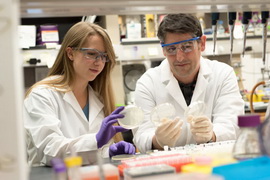
New Genetic Engineering Technique to Help Design and Study Biological Systems
January 25, 2017| |
 A team of researchers from the Washington University School of Medicine in St. Louis (WUSTL) has developed a new technique to regulate the amount of protein that a particular gene produces. The technique will allow biologists to tinker with genes, whether the goal is to turn cells into tiny factories for medicines, modify crops to grow with limited water, or study the effects of a gene on health.
A team of researchers from the Washington University School of Medicine in St. Louis (WUSTL) has developed a new technique to regulate the amount of protein that a particular gene produces. The technique will allow biologists to tinker with genes, whether the goal is to turn cells into tiny factories for medicines, modify crops to grow with limited water, or study the effects of a gene on health.
Dr. Sergej Djuranovic, assistant professor of cell biology and physiology at WUSTL said that the new technique is "a universal toolkit for modifying gene expression," and allows scientists to precisely regulate how much protein is produced from a particular gene. The process is simple and innovative and works in everything from bacteria to plants to human cells.
The technique takes advantage of mRNA translation, a key step in producing proteins from DNA. The research team tested the technique in bacteria, protozoa, yeast, plants, fruit flies, and mouse and human cells. It worked in all these organisms because RNA translation is an evolutionarily ancient process that occurs the same way across all lifeforms.
For more details, read the news release at the WUSTL website.
| |
Biotech Updates is a weekly newsletter of ISAAA, a not-for-profit organization. It is distributed for free to over 22,000 subscribers worldwide to inform them about the key developments in biosciences, especially in biotechnology. Your support will help us in our mission to feed the world with knowledge. You can help by donating as little as $10.
-
See more articles:
-
News from Around the World
- FAO Seeks More Support from G20 to Family Farmers to Meet Food Demands
- Study Shows Positive Impacts of GM Cotton Adoption in Burkina Faso
- Genetic History of Cocoa in Brazil Uncovered
- USDA Proposes Revisions on GE Crop Regulations
- New Genetic Engineering Technique to Help Design and Study Biological Systems
- Australia's OGTR Approves Field Trials of GM Cotton
-
Research Highlights
- Overexpression of Wheat Ferritin Gene Enhances Heat and Abiotic Stress Tolerance
- Rice Nicotianamine Synthase 2 Improves Iron and Zinc Levels in Wheat Grains
-
Beyond Crop Biotech
- Researchers Produce Human Hormone Precursor in Pichia pastoris
- India Launches Friendly™ Aedes Project to Combat Vector Borne Diseases
-
From the BICs
- SEARCA BIC Briefs Public School Officials on Course Offerings in Agri and Biotech
-
Announcements
- 17th Euro Biotechnology Congress
-
Resources
- VIB Fact Series: Golden Rice
-
Plant
- Targeted Multi-allelic Mutagenesis in Tetraploid Potato using CRISPR-Cas9
- DNA-free Genome Editing of Bread Wheat using CRISPR/Cas9 Ribonucleoprotein Complex
-
Read the latest: - Biotech Updates (February 11, 2026)
- Gene Editing Supplement (January 28, 2026)
- Gene Drive Supplement (February 22, 2023)
-
Subscribe to BU: - Share
- Tweet
